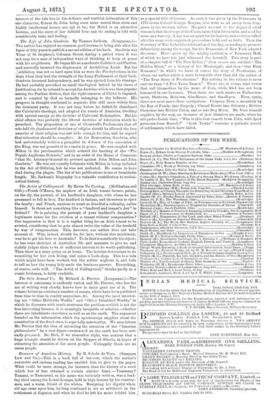Romance of American History. By M. Sehele de 'Pere. (Sampson
Low and Co.)—This is a book full of interest, which the author's extensive and curious reading has enabled him to give to his pages. What could be more strange, for instance, than the history of a word which has of late obtained a certain sinister fame,— Tammany ? Tama* or Tamanond, as his name was variously written, was a lead- ing chief among the Lenni-Lenape, held in high honour by his country- men, and a warm friend of the whites. Resigning his dignity when old age came upon him, he long continued to act as arbitrator in the settlement of disputes, and when he died he left his name behind him
as a special title of honour. As such it was given by the Delawares in 1716 to one Colonel George Morgan, who went as an envoy from Con- gress to the western tribes. Morgan's account of the departed chief was such that the troops of the Union turned him into a saint, and used his name as a war-cry. A day was sot apart for his honour, and societies called after his name were organised, processions held, and so forth. Then tho Secretary of War forbad the celebration of the day, as tending to promote debauchery among the troops, but the Democrats of New York adopted the name. Hence grew up the mighty institution of Tammany Hall, of which we have but just witnessed the downfall. This story is part of a chapter called "The Poor Indian ;" then comes one entitled " The Hidden River," or a history of the Mississippi ; and then Our First Romance," in which we have of course the story of Pocahontas, of whom our author takes a more favourable view than did the author of "The True Story of Pocahontas." But nothing in the volume is more curious than "A Few Town Names." There are, it seems, nine towns that call themselves by the name of Cain, while Abel has not been honoured in one instance. Then there are such names as Embarrass- ment, Dirttown, Robtown, Gin-House, and Small-pox. Then, again, there are most marvellous corruptions. Chapeau Dieu, a mountain by the Bay of Fundy, into Shepody ; Choual Ecartd into Shicarty ; Riviero Cheyenne into Riviere Chien, and so into Dog River. Mr. Yore himself supplies, by the way, an instance of how blunders are made, when ho misquotes Isaiah thus, "Who is this that cometh from Eden, with dyed garments from Bozrah ?" "Lost Towns" contains a pathetic record of settlements which have failed.






























 Previous page
Previous page